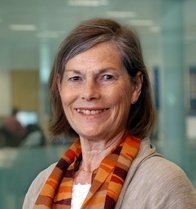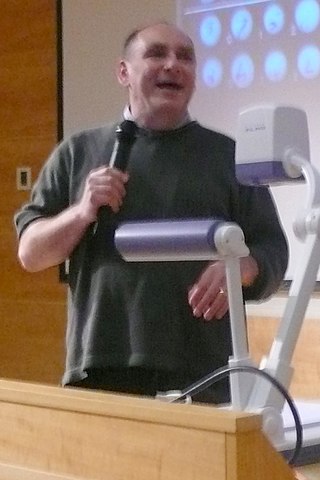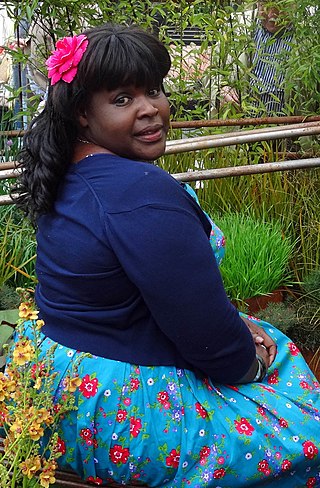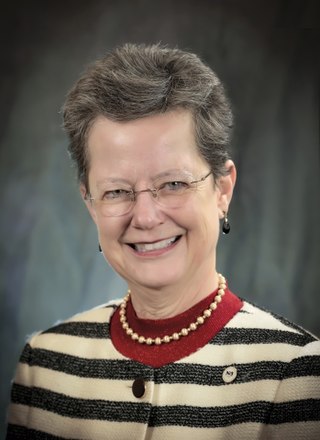
Piled Higher and Deeper, is a newspaper and webcomic strip written and drawn by Jorge Cham that follows the lives of several grad students. First published in 1997 when Cham was a grad student himself at Stanford University, the strip deals with issues of life in graduate school, including the difficulties of scientific research, the perils of procrastination, and the complex student–supervisor relationship. As of 2017, the strip's website received 6 million visitors each year.

Mildred Cohn was an American biochemist who furthered understanding of biochemical processes through her study of chemical reactions within animal cells. She was a pioneer in the use of nuclear magnetic resonance for studying enzyme reactions, particularly reactions of adenosine triphosphate (ATP).
Sir James Hough is a British physicist and an international leader in the search for gravitational waves.

Dame Louise Napier Johnson,, was a British biochemist and protein crystallographer. She was David Phillips Professor of Molecular Biophysics at the University of Oxford from 1990 to 2007, and later an emeritus professor.

Jonathan Andrew Crowcroft is the Marconi Professor of Communications Systems in the Department of Computer Science and Technology, University of Cambridge and the chair of the programme committee at the Alan Turing Institute.

Margaret Ebunoluwa Aderin-Pocock is a British space scientist and science educator. She is an honorary research associate of University College London's Department of Physics and Astronomy, and has been the chancellor of the University of Leicester since February 2023. Since February 2014, she has co-presented the long-running astronomy television programme The Sky at Night with Chris Lintott. In 2020 she was awarded the Institute of Physics William Thomson, Lord Kelvin Medal and Prize for her public engagement in physics. She is the first black woman to win a gold medal in the Physics News Award and she served as the president of the British Science Association from 2021 to 2022.
Gladys Amelia Anslow was an American physicist who spent her career at Smith College. She was the first woman to work with the cyclotron.
Mark Sheard Child FRS is a British chemist, and Emeritus Fellow of St Edmund Hall, Oxford.
Lesley Jane Yellowlees, is a British inorganic chemist conducting research in Spectroelectrochemistry, Electron transfer reactions and Electron paramagnetic resonance (EPR) Spectroscopy. Yellowlees was also elected as the president of the Royal Society of Chemistry 2012–14 and was the first woman to hold that role.

Sarah Cleaveland is a veterinary surgeon and Professor of Comparative Epidemiology at the University of Glasgow.
Willie Hobbs Moore was an American physicist and engineer. She was the first African American woman to earn a PhD in physics.
Jedidah C. Isler is an American astrophysicist, educator, and an active advocate for diversity in STEM. She became the first African-American woman to complete her PhD in astrophysics at Yale in 2014. She is currently an assistant professor of Astrophysics at Dartmouth College. Her research explores the physics of blazars and examines the jet streams emanating from them. In November 2020, Isler was named a member of Joe Biden's presidential transition Agency Review Team to support transition efforts related to the National Aeronautics and Space Administration.

Sidney Carne Wolff is an American astrophysicist, researcher, public educator, and author. She is the first woman in the United States to head a major observatory, and she provided significant contributions to the construction of six telescopes. Wolff served as Director of the Kitt Peak National Observatory (KPNO) and the National Optical Astronomy Observatory (NOAO). She is a member of the International Astronomical Union's Division G: Stars and Stellar Physics.

Anne Neville was the Royal Academy of Engineering Chair in emerging technologies and Professor of Tribology and Surface Engineering at the University of Leeds.

Sheila Rowan is a Scottish physicist and academic, who is Professor of Physics and Astronomy at the University of Glasgow in Scotland, and director of its Institute for Gravitational Research since 2009. She is known for her work in advancing the detection of gravitation waves. In 2016, Rowan was appointed the (part-time) Chief Scientific Advisor to the Scottish Government.
Ciara Sivels is an American nuclear engineer at the Johns Hopkins University Applied Physics Laboratory. She was the first black woman to earn a Ph.D. in nuclear engineering from the University of Michigan. She was named an IF/THEN Ambassador in 2019 by the American Association for the Advancement of Science.

Clarice Evone Phelps is an American nuclear chemist researching the processing of radioactive transuranic elements at the US Department of Energy's Oak Ridge National Laboratory (ORNL). She was part of ORNL's team that collaborated with the Joint Institute for Nuclear Research to discover tennessine. The International Union of Pure and Applied Chemistry (IUPAC) recognizes her as the first African-American woman to be involved with the discovery of a chemical element.

Brittany Lehua Kamai is an American astrophysicist and racial justice activist. Kamai is a postdoctoral fellow at the University of California, Santa Cruz and the California Institute of Technology. She was the founder of #ShutDownSTEM, part of the Strike for Black Lives held on June 10, 2020. A native Hawaiian, Kamai grew up in Honolulu and graduated from President Theodore Roosevelt High School and the University of Hawaiʻi at Mānoa. She completed her Master of Arts from Fisk University and her PhD from Vanderbilt University. Kamai is only the second native Hawaiian to earn a doctorate in astrophysics and the third to earn a PhD in physics.

Julia Mae Phillips is an American physicist. She began her career in materials research on thin films on semiconductors and has transitioned into leadership roles in science policy. She currently serves on the National Science Board.
Dr. John McNeile Hunter was an American physicist and chemist, and the third African American person to receive a PhD in physics in the United States. He spent the entirety of his career as a professor of physics at the Virginia State College, a historically Black college in Petersburg, Virginia, where he also established and served as the first chair of the college's physics department. Virginia State College's physics program was one of the first at a historically Black college in the country. Hunter's research was focused on thermionics.











